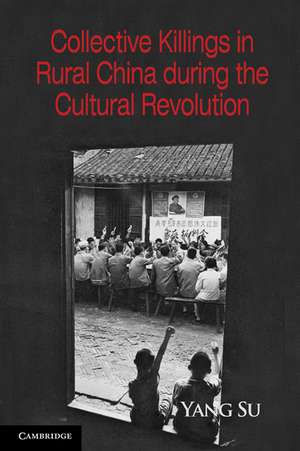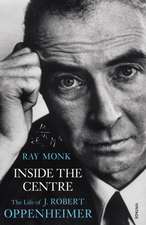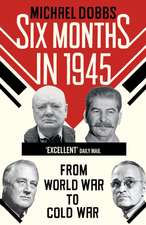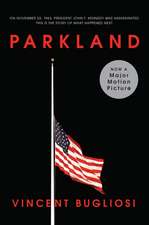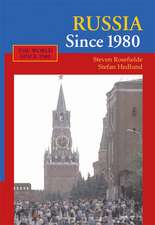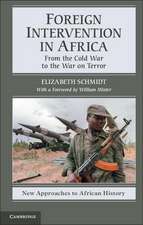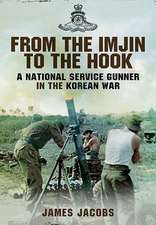Collective Killings in Rural China during the Cultural Revolution: Cambridge Studies in Contentious Politics
Autor Yang Suen Limba Engleză Paperback – 20 feb 2011
| Toate formatele și edițiile | Preț | Express |
|---|---|---|
| Paperback (1) | 238.13 lei 6-8 săpt. | |
| Cambridge University Press – 20 feb 2011 | 238.13 lei 6-8 săpt. | |
| Hardback (1) | 556.38 lei 6-8 săpt. | |
| Cambridge University Press – 20 feb 2011 | 556.38 lei 6-8 săpt. |
Din seria Cambridge Studies in Contentious Politics
-
 Preț: 251.27 lei
Preț: 251.27 lei -
 Preț: 220.86 lei
Preț: 220.86 lei -
 Preț: 203.50 lei
Preț: 203.50 lei -
 Preț: 238.15 lei
Preț: 238.15 lei - 9%
 Preț: 626.76 lei
Preț: 626.76 lei -
 Preț: 162.90 lei
Preț: 162.90 lei -
 Preț: 210.37 lei
Preț: 210.37 lei -
 Preț: 160.00 lei
Preț: 160.00 lei -
 Preț: 178.72 lei
Preț: 178.72 lei -
 Preț: 289.11 lei
Preț: 289.11 lei -
 Preț: 197.42 lei
Preț: 197.42 lei -
 Preț: 231.38 lei
Preț: 231.38 lei -
 Preț: 263.79 lei
Preț: 263.79 lei -
 Preț: 274.27 lei
Preț: 274.27 lei -
 Preț: 227.61 lei
Preț: 227.61 lei - 11%
 Preț: 637.54 lei
Preț: 637.54 lei -
 Preț: 474.87 lei
Preț: 474.87 lei -
 Preț: 225.50 lei
Preț: 225.50 lei -
 Preț: 269.58 lei
Preț: 269.58 lei -
 Preț: 201.59 lei
Preț: 201.59 lei -
 Preț: 229.56 lei
Preț: 229.56 lei -
 Preț: 306.73 lei
Preț: 306.73 lei - 11%
 Preț: 553.62 lei
Preț: 553.62 lei - 11%
 Preț: 694.04 lei
Preț: 694.04 lei -
 Preț: 231.05 lei
Preț: 231.05 lei -
 Preț: 305.33 lei
Preț: 305.33 lei -
 Preț: 201.59 lei
Preț: 201.59 lei -
 Preț: 230.51 lei
Preț: 230.51 lei - 14%
 Preț: 791.97 lei
Preț: 791.97 lei - 11%
 Preț: 555.03 lei
Preț: 555.03 lei -
 Preț: 251.27 lei
Preț: 251.27 lei -
 Preț: 251.27 lei
Preț: 251.27 lei - 11%
 Preț: 459.73 lei
Preț: 459.73 lei -
 Preț: 267.08 lei
Preț: 267.08 lei
Preț: 238.13 lei
Nou
Puncte Express: 357
Preț estimativ în valută:
45.58€ • 49.53$ • 38.31£
45.58€ • 49.53$ • 38.31£
Carte tipărită la comandă
Livrare economică 22 aprilie-06 mai
Preluare comenzi: 021 569.72.76
Specificații
ISBN-13: 9780521173810
ISBN-10: 0521173817
Pagini: 322
Ilustrații: 2 b/w illus. 3 maps 32 tables
Dimensiuni: 150 x 226 x 20 mm
Greutate: 0.44 kg
Ediția:New.
Editura: Cambridge University Press
Colecția Cambridge University Press
Seria Cambridge Studies in Contentious Politics
Locul publicării:New York, United States
ISBN-10: 0521173817
Pagini: 322
Ilustrații: 2 b/w illus. 3 maps 32 tables
Dimensiuni: 150 x 226 x 20 mm
Greutate: 0.44 kg
Ediția:New.
Editura: Cambridge University Press
Colecția Cambridge University Press
Seria Cambridge Studies in Contentious Politics
Locul publicării:New York, United States
Cuprins
1. Kill thy neighbor; 2. On the record; 3. Community and culture; 4. Class enemies; 5. Mao's ordinary men; 6. Demobilizing law; 7. Framing war; 8. Patterns of killing; 9. Understanding atrocities in plain sight.
Recenzii
“This is a truly terrific book, and long overdue too, leaving behind the well-trodden ground of the Red Guards in Beijing to focus unflinchingly on the horror of mass killings in the countryside. Yang Su has written a model of rigorous scholarship that squarely places the Cultural Revolution where it should have been all along, in the area of genocide studies on a par with Rwanda, as villagers turned against villagers, slaughtering each other in the hundreds of thousands.”
—Frank Dikotter, University of Hong Kong, author of Mao’s Great Famine
“Theoretically, this book is the first attempt showing that the development of modern genocide is not only shaped by the ideologically charged nation state, but also by the local actors and structural forces in ways quite unintended by the state actors. Empirically, this book reminds us once again that the Chinese Cultural Revolution (1966-1976) is one of the greatest tragedies of the modern world. It also turns our attention from the dynamics of the Cultural Revolution in China’s urban settings to the less known stories in rural areas. This book will be on our shelves as an outstanding work in the study of the Cultural Revolution and the politics of the Chinese communist regime, genocide study, and social movement research.”
—Dingxin Zhao, The University of Chicago
"Su tells a heart-rendering story and contributes new insights to the burgeoning academic literature on contentious politics and genocide."
— Andrew J. Nathan, Foreign Affairs
"Yang Su deserves great credit for uncovering the collective killings and for his penetrating analysis of their multiple causes"Jeremy Brown, Simon Fraser University, H-Net Reviews
—Frank Dikotter, University of Hong Kong, author of Mao’s Great Famine
“Theoretically, this book is the first attempt showing that the development of modern genocide is not only shaped by the ideologically charged nation state, but also by the local actors and structural forces in ways quite unintended by the state actors. Empirically, this book reminds us once again that the Chinese Cultural Revolution (1966-1976) is one of the greatest tragedies of the modern world. It also turns our attention from the dynamics of the Cultural Revolution in China’s urban settings to the less known stories in rural areas. This book will be on our shelves as an outstanding work in the study of the Cultural Revolution and the politics of the Chinese communist regime, genocide study, and social movement research.”
—Dingxin Zhao, The University of Chicago
"Su tells a heart-rendering story and contributes new insights to the burgeoning academic literature on contentious politics and genocide."
— Andrew J. Nathan, Foreign Affairs
"Yang Su deserves great credit for uncovering the collective killings and for his penetrating analysis of their multiple causes"Jeremy Brown, Simon Fraser University, H-Net Reviews
Notă biografică
Descriere
This book is the first to systematically document and analyze the atrocities surrounding the Cultural Revolution in China.
